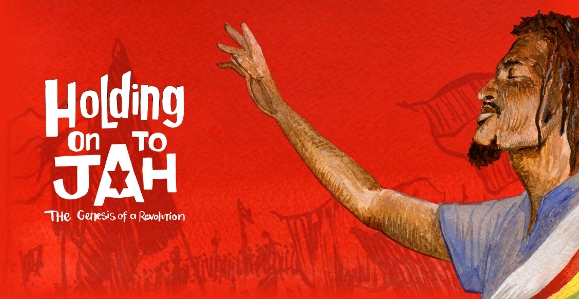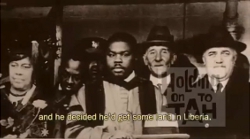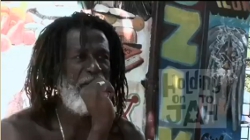Articles about reggae music, reviews, interviews, reports and more...
Holding On To Jah

Holding On To Jah
A lovingly made, easily digestible presentation of its subject to the world.

The steady drip of reggae film releases continues with this thoughtful, well executed if deliberately selective documentary examining the link between Rastafarianism and reggae in Jamaica. Producer and Groundation singer Harrison Stafford, and Groundation video and first time feature helmer Roger Landon Hall, have amassed an impressive cast of roots singers and Rasta elders, many of whom are linked to the Nyabinghi order.
These talking heads (including the Congos, Ras Michael of the Sons Of Negus, Bernard Collins of the Abyssinians, Prince Alla, Pablo Moses, Winston McAnuff, and the late Joseph Hill) are accompanied by a strictly roots reggae soundtrack, archive newsreel and stills. There is only minimal voiceover, from American reggae historian Roger Steffens, although he is given a leonine share of soundbites as an interviewee.
The washed-out yet colourful look of the film is similar to Stascha Bader’s Buena Vista Social Club-inspired 2009 release Rocksteady: The Roots Of Reggae. However, while both films come in a tropical, nostalgia tinted packaging, the content here is considerably more weighty and contentious for casual viewers.
 Jamaica’s “discovery”, colonisation, slave industry, and the Maroon rebellion provide a backdrop to 20th Century topics such as Jamaican Independence, the remarkable oratory and prophecy of Marcus Garvey, and the crowning and divinity of Haile Selassie. There is also a section on Rasta pioneer Leonard Howell and the beatings, trimmings, slander and indignities his followers had to suffer. The final act charts the rise of ska, rocksteady and reggae and examines the concept of Babylon and its connotations, closing with a feel-good message of universal love.
Jamaica’s “discovery”, colonisation, slave industry, and the Maroon rebellion provide a backdrop to 20th Century topics such as Jamaican Independence, the remarkable oratory and prophecy of Marcus Garvey, and the crowning and divinity of Haile Selassie. There is also a section on Rasta pioneer Leonard Howell and the beatings, trimmings, slander and indignities his followers had to suffer. The final act charts the rise of ska, rocksteady and reggae and examines the concept of Babylon and its connotations, closing with a feel-good message of universal love.
All the speakers give arresting contributions, but the erudite Pablo Moses is particularly insightful when discussing his nation’s history and culture. Abba Melchezidek, surviving advisor to the King of Kings, offers a valuable Ethiopian perspective on Selassie, while Steffens suggests that, from a musicological point of view, the seeds of reggae may have in fact come from the West of Africa, specifically Ghana (where Rasta communities exist today). With the exception of a fleeting appearance by artist-manager Bridget Anderson, no female perspectives are featured, giving the impression that the roots movement was a wholly male concern.
At times the chronology goes awry: with the 1962 Independence - described in disdainful word-sound-power rhetoric by Ashanti Roy and Prince Alla as putting them “in Di Pen” - coming before Garvey, Selassie and Howell.  That said, the film’s excellent sense of pacing and rhythm, and lovingly chosen soundtrack, suggest that aesthetic considerations have taken precedence over all else here. The Bob Marley tunes used are selected for lyrical and historical pertinence rather than popularity, and rub shoulders with such choice rhythms as Joe Gibbs Love Is Not A Gamble and Love Thy Neighbour by Yabby You.
That said, the film’s excellent sense of pacing and rhythm, and lovingly chosen soundtrack, suggest that aesthetic considerations have taken precedence over all else here. The Bob Marley tunes used are selected for lyrical and historical pertinence rather than popularity, and rub shoulders with such choice rhythms as Joe Gibbs Love Is Not A Gamble and Love Thy Neighbour by Yabby You.
More disconcerting is the decision - although the subtitle The Genesis Of A Revolution is a giveaway - to cut off the story at the height of the roots reggae era. There is no critique of the Seaga years, of dancehall, or of the new generation of Rasta artists who make music that channels the spirit of old. Landon Hall has stated that 100 hours of footage had to be distilled into just 1 hour and 40 minutes. But while editing so much content involves tough choices, so large an omission was likely a conscious one on the filmmakers’ part. The Bobo Ashanti Perfect (who sampled Garvey’s “In Life I Shall Be The Same” speech for his album Born Dead With Life) or Tarrus Riley (who sang over a revamp of Love Is Not A Gamble) could have given an uplifting coda to the narrative, avoiding the implication that, like Rocksteady, roots reggae is the music of a bygone age. Rightly or wrongly, there is no mention of the Bobo or other mansions of Rastafari outlined by Oliver Hill’s less reggae-focused Coping With Babylon. Instead Stafford and Landon Hall eschew division to present Rasta as one united front.
Overall, then, this is another “best face forward” celebration of its subject: aimed at a slightly more knowledgeable audience than Rocksteady's (but one that, like Groundation themselves, is partial to older reggae and suspicious of the new). Self-consciously assiduous (i.e. obsessive!) reggae students, therefore, may prefer more opaque and challenging views of Jamaican music and culture such as Jerome Laperrousaz’ Made In Jamaica, or Howard Johnson’s Deep Roots/Reggae Nashville series. Nevertheless, Holding On To Jah is worthwhile viewing for anyone who loves roots music and what it has to say.
Read more about this topic
Comments actually desactivated due to too much spams
Browse by categories
Recommended Articles
Latest articles
Recently addedView all
© 2007-2025 United Reggae. All Rights Reserved. Reproduction in whole or in part is prohibited. Read about copyright
Terms of use | About us | Contact us | Authors | Newsletter | A-Z














